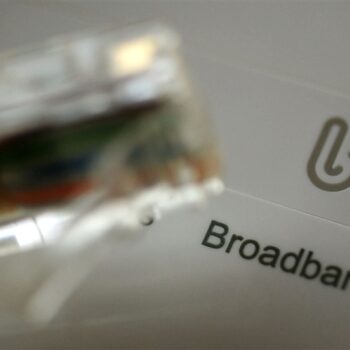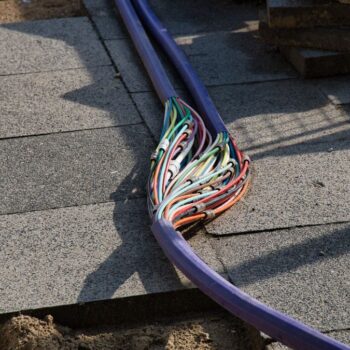A newbie's guide to broadband.deals
Before choosing your next broadband deal, it's important to shop around – not all broadband plans are created equal...! The first thing you'll need to do is to look at your household's needs – do you ever have slow download speeds or bandwidth issues when watching Netflix? If you do, then it's possible that your current broadband plan is too slow for your family's needs and a switch is needed.
But before changing to a new deal, there are some thing to be aware of. Firstly, some broadband contracts require a minimum period that can be up to 24 months. Others can require you to pay a set-up fee. Not only that, but broadband price increases mid-contract are becoming more commonplace... it certainly is a minefield! Let's explore what your best options might be, for switching to a new ISP today.
What broadband speed do I need?
This is probably THE most important question to ask yourself when you're thinking of switching...!
To answer this question, it's important to first understand how you actually use the internet. Some activities require more speed than others, including streaming video, file sharing, and online gaming. Other activities require less bandwidth, but can add up quickly over time, especially when multiple household members are using the same broadband service. To determine the amount of bandwidth you need, use the following criteria:
Firstly, check your current internet speed. It is likely that you're currently using a connection at a lower speed than you really need. This speed should be reflected in your current broadband agreement. If you're unsure, call your supplier and ask. They should be able to tell you your minimum broadband speed.
How fast is my current broadband package?
A good way to find out your broadband speed is to use an internet speed test — Google now offer one, or you can use one like this. There are many websites that provide speed tests nowadays. Speed tests will send data to a central server and calculate the time it takes to send and receive that data. By doing this regularly, you'll get an idea of the current speed of your connection.
The average speed for UK broadband connections is around 10Mbps, but you may find you need a higher or lower speed depending on your needs. A high speed is ideal if you want to use streaming TV, use video calling, or are into things like online games.
How do I choose which broadband deal is best for me?
Broadband and ADSL plans come in many different packages & prices. Some of them include additional features such as TV packages and phone calls. Some even include a mesh Wi-Fi system. Before committing to a deal, it is vital to compare the different details of each ADSL package. For example, some packages offer cheaper monthly prices than others, but you may end up with a larger bill if you don't use all of your data. Another important factor is the length of the contract.
Can I get fibre broadband?
If you've been wondering if you can get fibre or ultrafast broadband, you are not alone. More people are getting connected to the internet, and more service providers are offering fibre deals. Fibre broadband is faster than standard broadband, and the speeds can reach up to 1000Mbps. Fibre is also more reliable than standard broadband, which relies on pre-existing copper wiring.
However, it is important to know that fibre broadband isn't available in every part of the UK. It's currently only available in areas where the return on investment is high. Because of this, many rural areas aren't getting fibre broadband. In order to fill these gaps, organisations such as Broadband Delivery UK are working to provide fibre broadband to more rural areas.
If you're not sure if your area is eligible for fibre broadband, enter your postcode above and we'll check for free if you can get fibre broadband in no time.
Should I bundle broadband and TV into one plan?
Bundling these services can be cheaper than using separate providers and is also, of course, easier to manage. In addition, you'll generally be offered faster internet plans and a variety of different TV channels. Some packages will even include cinema and sports channels.
Most large internet service providers offer combined TV and broadband packages. You can choose between basic packages with standard channels or unlimited packages with extra channels. The type of TV package you choose depends on your preferences and your location. For example, if you want to stream videos and download music, you'll want a high-speed fibre broadband package. This service typically offers speeds of 76Mbps or more. Some cable services offer speeds up to 900Mbps.
Some packages also offer special incentives, such as free tech gifts, cashback, or vouchers. Check out any special offers you'll receive from a particular provider to make sure it's worth the money. Also, remember that a bundle can save you time.
Compare broadband tariffs (tip!)
If you're planning to get broadband for your home, it's a good idea to compare several different plans first, as they vary considerably. While the cheapest broadband offer may seem tempting, it might not always be the best deal. It may have hidden costs, such as postage and equipment, and the price will increase after the first three or six months. If you are on a budget, consider low-income broadband discounts that will help you save money on your service.
There are a variety of ways to compare broadband tariffs in the UK. The most basic option is to look for a provider that covers your area. Most of the top broadband providers cover most of the country, but some don't. For example, BT should be able to reach most postcodes, while Virgin Media and Hyperoptic cover a smaller area.
Another option is to opt for a social tariff, which is a cheaper phone and broadband package for those on benefits. This type of package is often called 'basic' or 'essential' broadband, and is delivered the same way as regular packages. Social tariffs are offered by various companies, and are cheaper than regular packages. Currently, they range from £10 to £20 per month.
Best broadband offers near me
There are a number of ISPs in the UK that offer cheap deals on fibre/broadband, each catering to a different demographic. These range from big players such as Virgin Media to mobile giants such as Talktalk and EE. There are also specialist sites, such as Uswitch, which specialise in ADSL deals for students and multi-tenant households.
- Check your postcode
Firstly, make sure to check your postcode has been entered into a comparison engine. This will give you accurate prices to your door, rather than just general prices.
- Consider your family's broadband usage
Decide what kind of speeds you want. If you aren't sure, then consider your family's usage patterns. For example, do they use Netflix from multiple devices at the same time?
- Run a free speed-test
Use one of the many free speed tests online, you can use Google's speed test (which is free) to ascertain what kind of speeds you are getting at the moment. If you're not happy with your current download speeds then make sure to opt for a faster 'average download speed'.
- Check new customer offers first
Make sure to see what offers new customers are getting, before you decide to upgrade. This will only strengthen your position as you may need to haggle for either a cheaper price, or a better package, or ideally both!
Choosing the best broadband contract will depend on how much you and your family will be using the internet, of course.
For example, if you have a large family, you'll want a high-speed connection that will cope with all of the different devices streaming content.
It's estimated that the average UK home has around 17 devices connected at once, so choosing a package with sufficient bandwidth will prevent frustrating interruptions - such as video buffering and lag. Alternatively, if you're a lone user and don't need a high-speed connection, you should opt for a cheap package that limits your usage.
The other thing to remember is: many broadband offers are only available for a short period of time. So if you're planning on signing up for a package, make sure you read the terms and conditions before committing. You can usually find a broadband deal that matches your needs and budget.
If you're a heavy internet user, you'll probably want to find a fibre broadband deal that will meet your needs. A good starting point is to look for speeds of 50-100Mbps. This is a good speed range for households with children or casual internet users, but 100Mbps is ideal for heavy users. You can also find bundle deals with other services, such as pay-TV or a mobile contract. A fibre broadband deal that includes all of these services may be the best choice for you.
Can I get fibre broadband in my area?
You can find out if fibre broadband is available in your area by using a fibre broadband checker. This tool will determine if fibre is available in your area and if you are eligible to use it. If it is, you will need to contact your local provider to arrange for installation.
If you have a small household, you can get away with using a cheaper fibre broadband speed under 50Mbps. However, if there are more than 1-2 people in the household, you may need a higher speed. If you have three or four people, a speed of around 100Mbps is recommended. If you want to use the internet for gaming and other bandwidth-hungry activities, a higher speed is recommended.
If you live in a densely populated area, you're more likely to receive fibre broadband. However, it is important to note that the service may not be available in every area. If you live in a rural area, you may need to look elsewhere for service.
Which are the best fibre broadband providers in the UK?
This isn't an easy question, but we're going to attempt to answer it. Firstly, you need to weigh up what you are looking for from your internet provider. If it's speed alone, then consider getting fibre broadband – most of the larger providers in the UK can provide either FTTC or FTTP.
The average fibre download speed is around 120 Mbps (which is a lot) but this can go as high as 900 Mbps, or even faster for providers like Virgin Media.
It really depends on what area you live in; if you are in a Virgin Media-enabled area then you can probably get an extremely fast connection. But sadly, Virgin Media only covers around half of the UK population at present. For other options, try companies like TalkTalk.
| Best UK Broadband Plan Features | |
|---|---|
| 💰 Cheapest 150Mbps broadband | £33.99 |
| 🔥 Gifts available with broadband plans | Wi-Fi mesh, Antivirus |
| 🥇 Best 900Mbps broadband plan | £50.99 |
| 🏆 Min. contract length available | 30 Days |
Do I need fibre internet?
There are several important things to consider, when deciding on whether or not you should get fibre internet. First of all, the speed you require is important if you want to use multiple services. A high speed will allow you to handle many simultaneous tasks at once. Additionally, the more people in your household, the more bandwidth you will need. For example, four people streaming Netflix at the same time will need four times the recommended speed. If the speed is not high enough, arguments about internet usage will occur.
Another factor that should be considered when deciding whether to go for fibre is the price. Fiber broadband is often cheaper than traditional ADSL. This means that if you need a fast connection, it may be worth the extra money. However, you must check with the provider to see if the cost is comparable to your current connection.
How does fibre broadband work?
Right, let's get technical...!
Fibre internet works by sending pulses of light through a fibre optic cable. These pulses are incredibly fast and carry what's called "binary" data. Binary data is made up of ones and zeros, which send messages in eight-part patterns known as bytes. The light can travel up to sixty miles before degrading and then passes through an optical amplifier, ensuring no data is lost.
Fibre-optic broadband comes in several forms, and the speed of the connection varies depending on which type is available to you. FTTC, or fibre to the cabinet, is the most common way of bringing fibre to your home. In this method, the fiber connects to your broadband exchange from a green cabinet on the street. Copper wires run from the cabinet to your house. This method, however, has some drawbacks.
Fibre internet is faster and more reliable than most other types of internet. In fact, it offers significantly higher speeds than cable internet. Most plans have a maximum of 1,000 Mbps. In addition to its faster speeds, fibre internet is safe and secure.






























